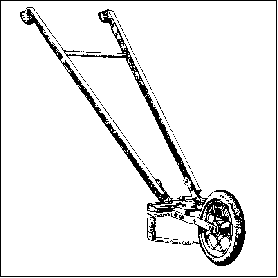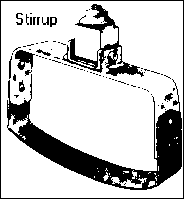

EFAO News Index | Virtual Library | Magazine Rack | Search
 Consider a Wheel Hoe
Consider a Wheel Hoe by Gord Chiddicks
 For years, many of us have been using a primary
tillage tool, the rototiller, for what amounts to secondary
tillage, the control of garden weeds during the growing season.
On the surface this seems like an effective way to weed because
it leaves the soil seemingly friable, permeable, and weed-free.
In fact, rototilling probably does more harm than good. Working
the soil to too great a depth mixes in lots of oxygen and
unnecessarily burns up organic matter during the hot summer
months. Deep cultivation also brings dormant weed seeds to the
surface to germinate, and harms the earth worm population. Some
are finding the wheel hoe fitted with a stirrup, a faster,
easier, and less harmful alternative. Besides the lower cost
($200-$400), and the fact it does not use fossil fuel, the wheel
hoe also has advantages over hand-hoeing as well. A good wheel
hoe makes aiming the hoe blade, regulating the working depth, and
effectively transmitting all the body's power through the arms,
more controllable and effortless than traditional hand-hoeing.
Most of the power for hand hoeing comes from the arms. A wheel
hoe allows the operator, working in a comfortable position, to
transfer power from the entire body in a line of force aimed
directly at the hoe attachment itself. Last summer I fabricated
my first wheel hoe and a lot of local people seem interested in
trying one of these simple machines. My hoe has both twin seven
inch stirrups for straddling, and a single fourteen inch one for
walkway cultivation. It can be fitted with a single central wheel
or tandem wheels for straddling. I have been cajoled into
building one more this spring and I would be happy to share the
specifications with anyone who wants to make their own. Who
knows, maybe there is an enterprise here?
For years, many of us have been using a primary
tillage tool, the rototiller, for what amounts to secondary
tillage, the control of garden weeds during the growing season.
On the surface this seems like an effective way to weed because
it leaves the soil seemingly friable, permeable, and weed-free.
In fact, rototilling probably does more harm than good. Working
the soil to too great a depth mixes in lots of oxygen and
unnecessarily burns up organic matter during the hot summer
months. Deep cultivation also brings dormant weed seeds to the
surface to germinate, and harms the earth worm population. Some
are finding the wheel hoe fitted with a stirrup, a faster,
easier, and less harmful alternative. Besides the lower cost
($200-$400), and the fact it does not use fossil fuel, the wheel
hoe also has advantages over hand-hoeing as well. A good wheel
hoe makes aiming the hoe blade, regulating the working depth, and
effectively transmitting all the body's power through the arms,
more controllable and effortless than traditional hand-hoeing.
Most of the power for hand hoeing comes from the arms. A wheel
hoe allows the operator, working in a comfortable position, to
transfer power from the entire body in a line of force aimed
directly at the hoe attachment itself. Last summer I fabricated
my first wheel hoe and a lot of local people seem interested in
trying one of these simple machines. My hoe has both twin seven
inch stirrups for straddling, and a single fourteen inch one for
walkway cultivation. It can be fitted with a single central wheel
or tandem wheels for straddling. I have been cajoled into
building one more this spring and I would be happy to share the
specifications with anyone who wants to make their own. Who
knows, maybe there is an enterprise here?
Copyright © 1995 Ecological Farmers Association of Ontario. Reprinted with permission. All rights reserved.
Info Request | Services | Become EAP Member | Site Map
Give us your comments about the EAP site
Ecological Agriculture Projects, McGill University (Macdonald
Campus)
Ste-Anne-de-Bellevue, QC, H9X 3V9 Canada
Telephone:
(514)-398-7771
Fax:
(514)-398-7621
Email: info@eap.mcgill.ca
To report problems or otherwise comment on the structure of this site, send mail to the Webmaster